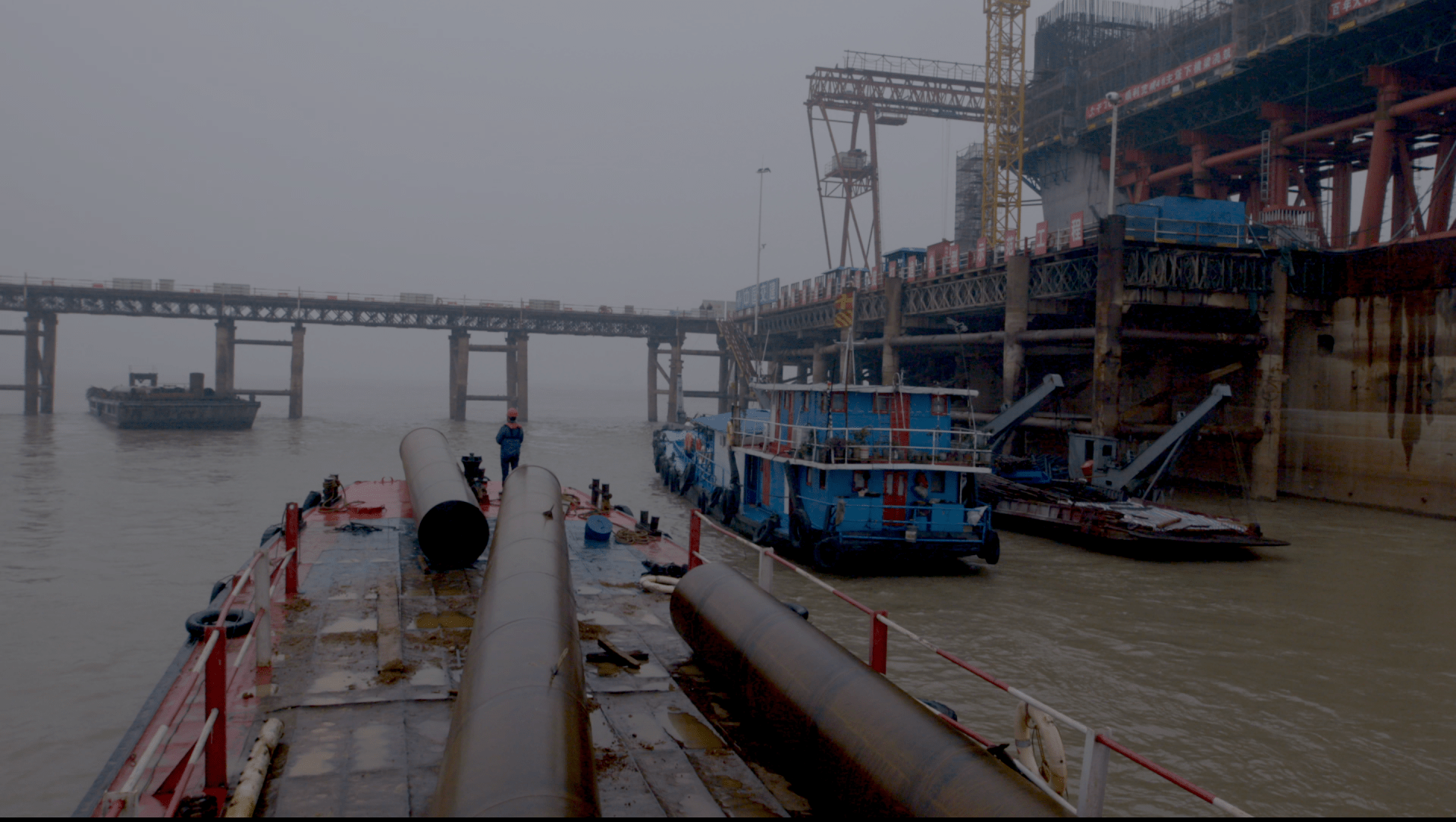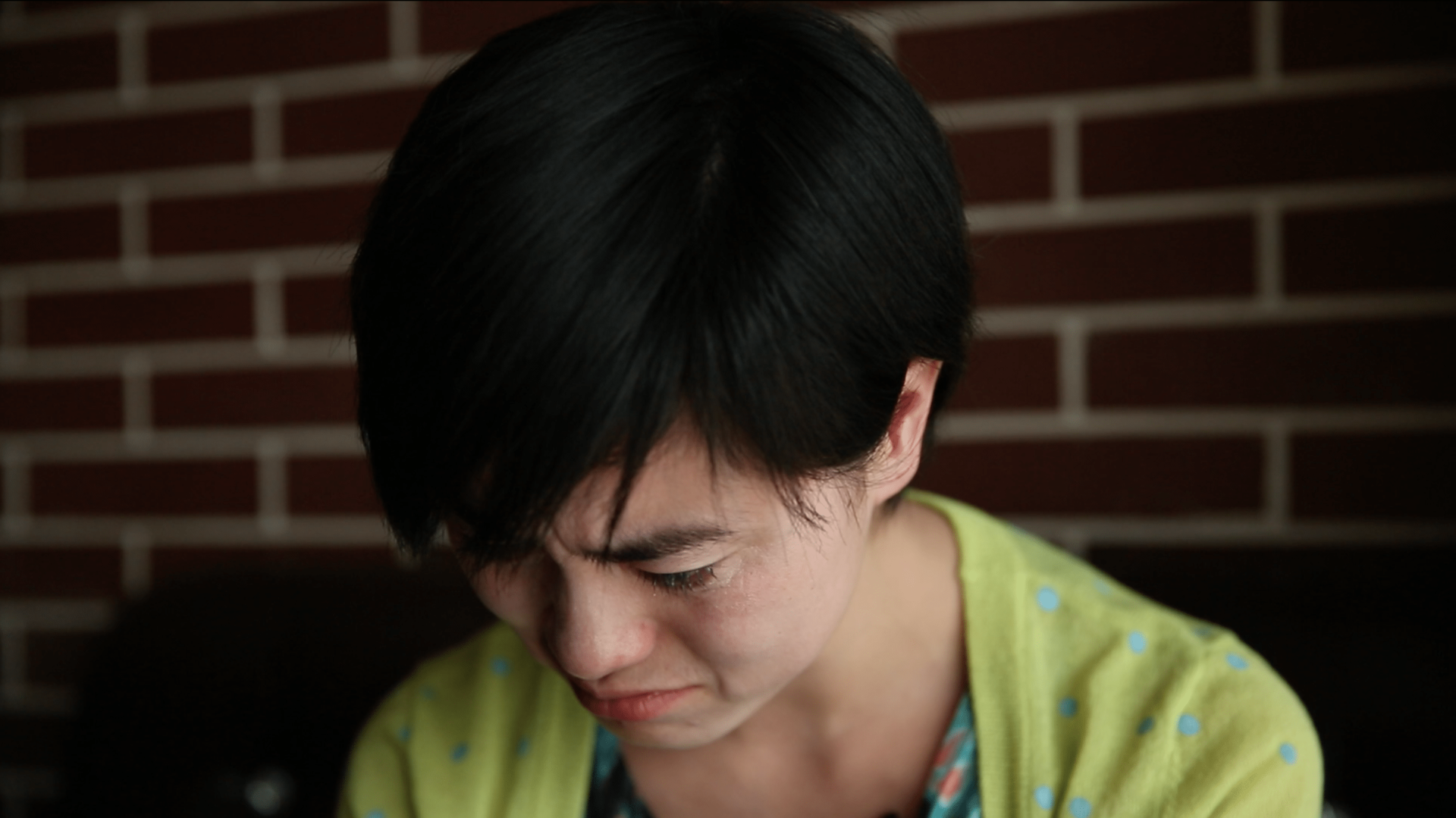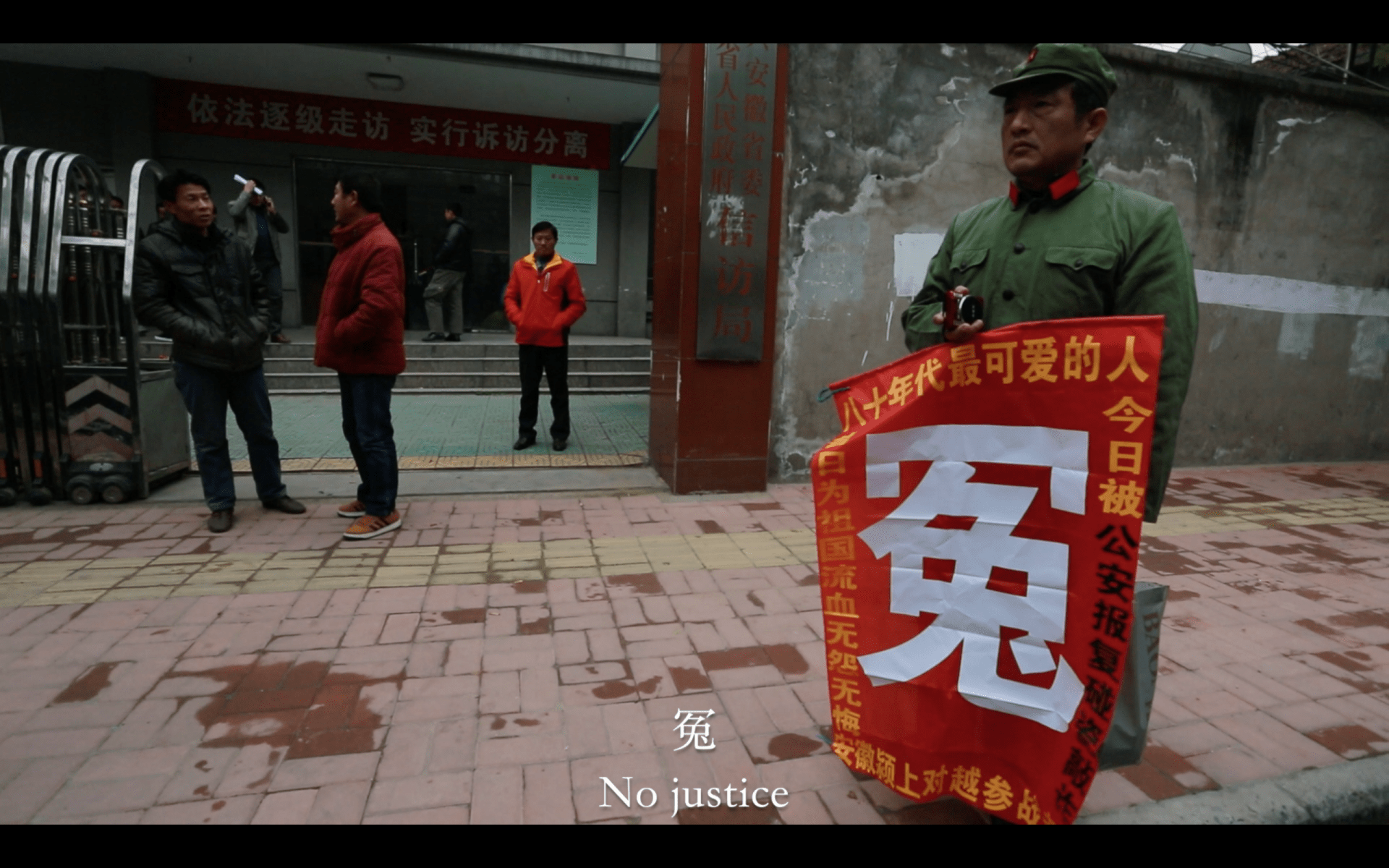Director │ CHEN Dong-nan
Ping and Sheng are young members of a Miao ethnic village church choir, which resides in the wild mountaintop in Yunnan, China. In the 1910s, western missionaries brought the Gospel here and taught the villagers to sing in four-part harmony, which they passed down from generation to generation. Ping is the most beautiful girl in the village. Sheng is determined to become a missionary.
Recently, the choir was discovered by the county government, which branded the village as a hidden refuge of exotic minority people who, for some strange reason, can sing classical European music. The choir stands under national spotlight. Tourists flock to the mountains. Real estate developers plan to rebuild the village. Ping and Sheng's lives take vastly different paths than they’d planned.

Director │ WANG Yang
Producer │ WANG Guo-qing
In Wuhan, China, people want to build a mega-bridge across the Yangtze River.
The bridge symbolizes the speed and power of China. Under enormous pressure, the engineers are exhausted mentally and physically. The individual experience of life is intertwined with the institutional stress. Leaving hometowns for the city, peasant workers from all over the country have come here for better life. Due to the rapid development in China over the last 30 years, hundreds of millions of peasant workers have come to the city. They contribute to the the construction of China, and bear the drastic changes brought by it; they are away from their family; they put it all out to work; while the farmlands are abandoned and traditions lost.

Director │ZHAO Chang-tong
ZHAO Sheng-rong was my grandfather’s name. He was bereaved of his mother when he was a child, of his father an adolescent. In wartime, he alone took up the responsibility of supporting the whole family. In his middle age he married and begot three sons. Because of his cultural background he got to work for China Railway till retirement. Chinese opera had his love. He was a regular at the theatre. In his later years, his house was demolished by force. Dust was returned to dust. Suddenly he was gone forever. It was not until then that I realized the familiarity one felt about a person and an emotion could be halted abruptly and could never be had again.

Director │HU Bo
The wording “zone of subsidence” co-exists with “mining.” It is related to human civilization and social development, whereas it can only be found in the shadow of past glory. The film narrates the past and the present in the zone of subsidence, mainly through the story of the relocation of the elderly Fengling YANG and his family that live in the zone of subsidence in Fushun City, Liaoning Province. Revealing the wound of a resource-exhausted city from one side, the film presents the symbiotic karma of men and nature as well as the perplexity and the persistence of the residents under the change.

Director │ Jill LI
Producer │ Samuel CHAI
Can the thousand-year-old story of ill-fated peasant uprisings in China be altered? This is a story of the trials and tribulations endured by the people of one small, traditional fishing village by the sea of Shanwei, Guangdong. In 2011, villagers staged their own “Wukan Spring” in an effort to protect their land and overthrow their “Shanwei Quaddafi”, the incumbent village chief who had ruled for 40 years. Two years later, while enthusiastically campaigning for the young Xing’s second run for village office, Hong was forced to flee to the United States. And the former protest hero Lin Zuluan found himself facing unexpected dangers. A Village By the Sea documents the political awakening of a village, it’s two democratic elections, along with the tumultuous lives of three generations.
This is a story of hopes and dreams sown into the land of the people. This film depicts the complex realities and uncertainty now China is faced with.

Director │ Tenzinsedon
Producer │ Ming
Tsekhor is one of the circumambulation paths surrounding Potala Palace. Once the path was only trodden by the pilgrims, whereas now it is full of travelers and vendors. On one side of Tsekhor lied a big wide road; on the other the forever standing Potala Palace. Nested in-between, Tsekhor seemed like Lhasa in miniature. The three protagonists in the film were born at different times and in different places. However, they all relied on this path for their living. Their intertwining destinies reflected the modernization of an ancient city.

Director │ WU Po-hung
Producer │ KUNG Hsiang-heng, CHENG Jing-ru
When the Himalayan snow melted, Chung-yuan Yang embarked for the village of Tashi, at the immense altitude of 4,500 meters above sea level. In 2015, he returned for the tenth time, like a migratory bird.

Director │ CHENG Ching-hsin
Producer │ LIU Chia-hsin
The first time I heard the name Jiong-lin, I just returned from afar. Friends were recounting the night when he didn’t come home and the following day when the icy body was fished from the river. More and more of those who knew him uttered his name, and recounted their memories of him.
Jiong-lin made three journeys around the island on foot, and recorded them in his diary. Retracing his steps, other friends and I embarked on the same journey. We walked upon the paths he had trodden, visited the people he had met, and tried to put pieces of the stories together.
I gaze upon this island, onto which he had given his passion. His existence resembled a bridge that connected all the different places, and all the people who, each in their own way, strived to live on this island.
He, had become this island.

Director │ YU Guo, GUO Rong-fei
In China, 16 million women are married to gay men without knowing. These women are called Homowives. As Director YU documents the stories of three women of this group, the idea of coming out to his mother crossed his mind. But not until he turned the camera to his mother and reflected on the role he plays did he realize that, as a homosexual man in China, whichever choice he makes , whether out of helplessness or powerlessness, would inevitably drag a woman into an inescapable tragedy.

Director │ Han YAN
Producer │ Eddie LIU
Zhang-ning was a white-collar worker in Foshan. She obtained no sense of satisfaction from work. The life of a city had wearied her. Lost in life, she embarked on a journey to Yunnan. There, she encountered a Mosuo man.
Bingma is a lively, handsome young man. Backpackers had thus nicknamed him the Andy Lau of Lugu Lake. Among all songs stored in the MP3 tourists gave him, his favourites are Enigma from Germany and Jay Chou from Taiwan.
Zhang-ning and Bingma had met and fallen in love on the shore of Lugu Lake. One of them aspired to return to nature; while the other sought to be connected to the city. Under the rapid development in China, the two of them started a cross-cultural love story unfavoured by others, regardless of their very different background; one of the city, the other of the countryside.

Director │ WU Jian-xin
Young farmer JIANG and his wife PING return to the countryside from the city, diving into Buddha sculpture carving and invites Buddhist Gang WANG to the village to give them instructions for carving. Their life of making Buddha sculptures may seem stuck in a rug; it is their process of religious practice. The documentary is a complete record of the making of a Buddha sculpture and their aloof lifestyle. It was also tells of influence brought by their change of life on the Buddha sculpture making. Is it possible for farmers that no longer farm and urbanites that are away from the city to find the wonderland in the bottom of their hearts respectively from this simple and tranquil country life?

Director │ WANG Jian-jun
Producer │ HAN Lei
Chou: He was once the only ceramist in an old village, making a living from selling his works. But the sudden development of tourism brought him numerous competitors, whose techniques were much newer, cheaper, and more efficient. Although Chou made up his mind to preserve traditional skills, he eventually failed in the battle against modernity.
Yang: Decades ago, he wandered to this village and saved a retarded girl’s life. After that, they depended upon each other for life. Yang’s job was to deliver ceramic funerary objects to the cemetery, but the pay was very little. In order to apply for pension from the government, old-aged Yang was planning to go back to his hometown for a legitimate citizenship.
Liu: Yang’s neighbor. Several years ago, he came to this village for a job. However, he was finally laid off due to old age. His wife ran away from home and left two children behind. To raise the children, Liu had no choice but to keep looking for a new job.

Director │ HOU Ning
Producer │ Gary SHIH
Hundreds of thousands of Muslims from the Muslim area in western China open noodle shops in the mainland. This was also the last resort for the 14-year-old MA Xiang, after he dropped out from school. For him, happiness was the brief moments he remembered sharing with his mother. When he tried to find back the missing moments, he found himself facing conflicts between faith and beliefs as well as the challenges of reality and survival. Is this tiny noodle shop going to be the starting point of his own happiness?

Director | Vincent DU, HAN Meng
Producer | Kathy Huang
China’s National Children is a character-driven documentary exploring the lingering impact of China’s controversial one- child policy. We intimately follow the journey of several women who search for their families that abandoned them decades ago. We also meet a passionate volunteer who attempts to facilitate these reunions. Through these experiences we are given a unique insight into the deep wounds that the one child policy inflicted on ordinary citizens.
We meet several women who are reunited with their birth parents through the volunteer’s efforts. Cai Fengxia has been looking for her birth parents for 12 years. Zhang Chunrong didn’t learn about her biological parents’ abandonment until her adopted parents passed away. Li Junfen doesn’t want to be reunited with her biological parents despite a matching DNA sample with her biological mother, who drowned two of her baby daughters in the 1970s.

Director │ CHEN Siyi
Producer │ XU Ruohan
Dr. Wu, Dr. Lee and Dr. Shen work at the ER of a small hospital in China. They are in different stages of their life, but they all face a career crisis.
Dr. Shen is secretly considering early retirement after a patient murdered a doctor at a nearby hospital.
Dr. Lee treats his patients with a cynical attitude ever since the family of a patient threatened him at knifepoint.
Dr. Wu is young and optimistic, but deep inside, he’s troubled by the death of a patient he failed to save. He fears violent retribution if he makes the same mistake again.
Despite their concerns, all three of them stick to their jobs. But, how much longer can they hold up?

Director │ CHEN Qi
In 1990, I was born in Huainan, to a miner father. In the same year, economic reform was launched in China. As a consequence, the city was hit by the first of its many economic crises. When I was seven, the city was hit by the second. My mother chose to leave the family, so my father raised me to adulthood. In 2014, the crisis befell the city for the third time, and countless families were dragged into this vortex of misfortune. I chose my family, my father, godmother and my two friends who worked in mining after the 90s as my protagonists. I based the story on my family and recounted the incidents the miner families had to go through when the city, economically dependent on natural resources, met its decline; what the miners earned could barely support their family, their contracts were terminated against their will. When it is time for them to build up a family, to marry and to bear children, how will they deal with the problems they were faced with? How will they put up a resistance within the frame of the system? How will they manage to survive? And how will the city change in turn?

Director │ Sean WANG
Producer │ ZHAO Jia
Decades ago, nearly 10,000 Chinese moved to Greece to engage in trading business. Now as the refugee crisis broke out, millions of refugees took the same path they had trodden before. The “big sis” CHEN Xue-yan, along with other Greek Chinese decided to organize a volunteer group to help the refugees. This was the first time that they walked out of the self-contained Chinatown and offered their help to strangers in their second home. A unique symbiosis has formed among the Greek indigenous people, Chinese and the refugees, on this land of gods. Will the “Chinese method,” on which they insist, really give the refugees the help they need?

Director │ Maso CHEN
Wenlin Elementary School is a long-established school. The newly appointed principal Mr. Chu and young Director of Student Affairs Mr. Lai just introduced a financial education initiative which included setting up a bank and issuing currency in the school.
At the beginning of this year, Bank of Wenlin started operation among thirteen pioneering classes assisted by their teachers. Students were all very excited when they received their “salaries” and became more active in taking part in the manual labor at school. Gradually, some teachers noticed how students became overly utilitarian, and thus started to reflect on whether their own concept of money have brought adverse effects on their students.

Director │ MA Chi-hang, Machi, CHENG Wai-sum, Haze
When the harbor in Hong Kong first opened up, a group of people lived on boats and moved wherever they find catches of fish. They called themselves “boat people” and excelled at expressing themselves in singing. They transformed the stages of a life journey, “birth, aging, illness, and death,” into melodies and lyrics. This film tells the stories of three boat dwellers: an old man retiring to an island and singing songs of stories to entertain visitors; a Jesus-reclaiming lady who used the fishermen’s melodies to sing Gospels; and a Hong Kong woman picking garbage by the harbor. Through their life experiences, family lives, and religions, an ignored group of people was reconstructed to preserve the disappearing memories. Living on the sea seem romantic, but is in fact full of bitter sufferings that none wants to look back. Beyond the seafront is the sorrow and joy, all carried in the fishermen’s ballads.

Director │ MO Jin-jin
Producer │ Eddie XING
Ming’s family is part of the Tankas, the last boat dwellers in China. For thousands of years, the Tankas lived on water, but now the modern civilization slowly invaded and took away the tranquility on water. As they face the choices to go ashore or not, the three generations of Ming’s family each have an idea of their own. In 2010, Ming just turned 18 and was determined to move on land. However, misfortune had since followed him to places. His father also considered moving ashore because of the reducing fish load resulted from the deteriorating environment. Whereas the 80-year-old grandmother still hoped to be born and to die on water. Nevertheless, the official letter arrived and ordered everyone to move ashore, igniting the burning conflicts inside everyone of the three generations. Would they be able to return to the peaceful life they used to have?

Get daily insight and update containing tips, skills for your creativity
Zero Spam. You Can Unsubscribe Anytime
